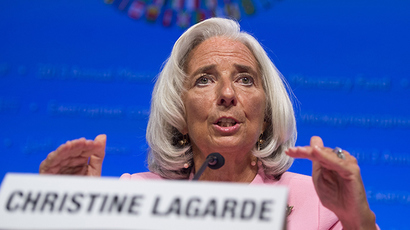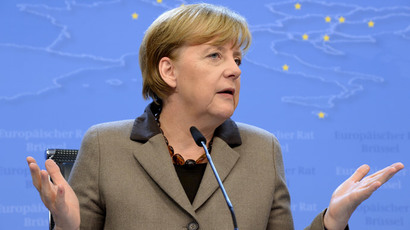EU, US reaffirm 'energy independence' gameplan
US and EU diplomats have said they will help Ukraine cut back on Russian gas, and also promised to help diversify the Russian-dominated European energy market, a difficult long term task for energy-dependent EU countries.
US Secretary of State John Kerry, EU foreign policy chief Catherine Ashton and other energy advisors met in Brussels on Wednesday for an energy summit.
“Developments in Ukraine have brought energy security concerns to the fore and prove the need to reinforce energy security in Europe,” the summit statement said.
Ukraine is the main transit route for Europe-bound Russian gas exports - about a third of Europe’s gas passes through the country - and is therefore crucial to energy stability.
Russia has invested billions into European gas networks and has partnerships with German, Italian, and French utilities. Italy’s Eni, France’s EDF, and Germany’s Wintershall are all partners in Gazprom’s $45 billion South Stream project, and additionally to another pipeline that bypasses Ukraine to deliver gas to Europe.
The council said energy ties with Russia “must be based on reciprocity, transparency, fairness, non-discrimination, openness to competition and continued cooperation to ensure a level playing field for the safe and secure supply of energy.”
The strategy of "leveling the playing field" will include expanding the Southern Gas Corridor, which stretches from Azerbaijan to Turkey to Europe, and has the potential to meet 20 percent of EU gas demand.
On the sidelines of the meeting, Gazprom CEO Aleksey Miller met with Guenther Oettinger, the EU’s energy commissioner, and Frank-Walter Steinmeier, Germany’s foreign minister, and discussed German-Russian energy cooperation.
On Thursday, the head of Naftogaz, Ukraine’s state-owned gas company, will hold talks in Moscow with energy ministers.
Towards energy independence
Ukraine imports nearly 50 percent of its natural gas from Russia, a country it now finds itself at diplomatic ends with, as it moves towards EU integration. Though the country’s 2020 goal of complete “full gas sufficiency" seems far off, the US and EU are prepared to help, at least, with diversification.
The US-EU Energy Commissions said Ukraine can move away from Russian gas by increasing gas storage capacity, reverse flow of gas, and working with the International Monetary Fund to become an competitive energy economy.
Increasing the number of storage facilities or increasing the capacity of existing sites could be a capital heavy task that Ukraine’s economy is not ready to tackle alone. However, if parts of Ukraine’s energy sector are privatized, investment in storage facilities is viable.
Reverse-flow, or getting European countries like Slovakia, Poland, Hungary or Germany, to begin sending gas to Ukraine, is another option.
"We expect that Naftogaz can be get 20 billion cubic meters of gas from reverse flow. Its price is lower than the Russian, and now averages $ 350 per 1 thousand cubic meters, " he said.
Helping Ukraine develop its vast shale reserves, believed to be the third largest in Europe, will also be priority of the US-EU commission.
Before the Maidan protests broke out in November, Kiev secured a $10 billion deal with Chevron to explore shale fields in western Ukraine.
Much of Europe hopes to emulate the US shale boom, which has brought energy independence.
Another option is turning to nuclear energy, as Ukraine is home to Europe’s largest nuclear plant, Zaporizhzhia in southeast Ukraine.
Russia still has a strong hold on gas pipelines and fields in Ukraine, and Gazprom, Russia’s largest state-owned gas producer, has $1.7 billion of debt leverage over Ukraine, which hasn’t paid its gas bills since 2013.
Rising debt caused Gazprom to raise prices for the second quarter of 2014 by 44 percent to $385.50 per thousand cubic meters, a $117 increase.














